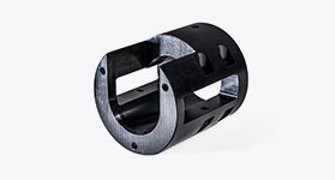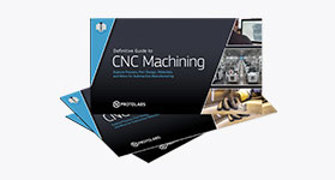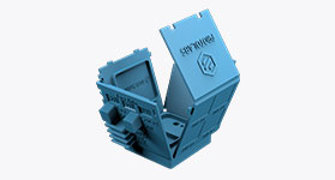Plastic CNC Machining Service
Get machined plastic prototypes and production parts.
CERTIFICATIONS
ISO 9001:2015 | AS9100D | ITAR

We stock a variety of thermoplastic materials for machined prototypes and production parts.
Available Machined Plastic Options:
|
|
Machined Plastic Material Properties
| Plastic Material | Description | Tensile Strength | Impact Strength | Heat Deflection |
|---|---|---|---|---|
| ABS | Low-cost engineering grade plastic. Easy to machine and offers dimensional stability. | 6,100 psi | 2.7-7.7 ft-lbs/in | 203-214° F |
| ABS-Flame Retardant | Flame retardant benefits with slightly lower tensile strength and heat deflection than standard ABS | >5,500 psi | 4 ft-lbs/in | 194° F |
| Acetal 20% Glass Filled / Delrin 570 | 20% glass-filled fiber with high stiffness and excellent performance at elevated temperatures | 8,500 psi | 0.8 ft-lbs/in | 316-345° F |
| Acetal Copolymer | High strength and stiffness. Low moisture absorption | 8,800 psi | 1.0 ft-lbs/in | 230-316° F |
| Acetal Homopolymer / Delrin 150 | High tensile strength, creep resistance, and overall toughness | 9,000 psi | 1.5 ft-lbs/in | 257-336° F |
| Acetal Static Dissipative / Tecaform SD | Excellent bearing and wear properties. Good for components that will undergo friction or fluid flow contact | 6,600 psi | 1.8 ft-lbs/in | 190° F |
| CPVC | High heat and corrosion resistant. Self extinguishing and flame spread of less than 20 | 7,300 psi | 9 ft-lbs/in | 198° F |
| HDPE | Impact resistant, tensile strength, and chemical and corrosion resistant | 4,600 psi | 1.3 ft-lbs/in | 176° F |
| LDPE | More flexible than HDPE. Easy to machine and offers chemical and corrosion resistance. | 1,700 psi | No Break | 160° F |
| Nylon 6 | Excellent bearing and wear properties. Good overall mechanical properties | 10,000 psi | 0.6 ft-lbs/in | 200-370° F |
| Nylon 6/6 | Outstanding wear resistance and frictional properties. Poor dimensional stability | 10,000 psi | 1.1 ft-lbs/in | 194-455° F |
| Nylon 6/6 30% Glass Filled | High heat deflection combined with superior wear and abrasion resistance. | 12,000 psi | 1.0 ft-lbs/in | 482-490° F |
| Polycarbonate (PC) | Natural transparency with high impact strength | 8,000-9,500 psi | 2.0-16.0 ft-lbs/in | 270-280° F |
| Polycarbonate (PC) 20% Glass Filled | Higher tensile and and temperature properties than unfilled PC | 16,000 psi | 2.06 ft-lbs/in | 298° F |
| PEEK | Good material option when thermal, chemical, and combustion properties are required | 14,000 psi | 1.55 ft-lbs/in | 285-482° F |
| PEI / Ultem 1000 | Translucent amber in color. | 15,200 psi | 1.0 ft-lbs/in | 392-410° F |
| PEI 30% Glass Filled / Ultem 2300 | High heat resistance and retains tensile properties at elevated temperatures | 24,500 psi | 1.6 ft-lbs/in | 414° F |
| PET | Excellent wear resistance, high flexural modulus, and is a good electrical insulator | 11,500 psi | 0.6 ft-lbs/in | 175-240° F |
| PMMA / Acrylic | Rigid thermoplastic with UV stability and transparency | 10,809 psi | 6.8 ft-lb/in² | 185-212° F |
| Polypropylene Copolymer | Versatile, all-purpose thermoplastic that is easy to machine and low cost. More pliable than homopolymer | 4,200 psi | 1.2 ft-lbs/in | 96-195° F |
| PP Homopolymer | High strength-to-weight ratio and good performance in thermoforming and corrosive environments | 4,800 psi | 1.2 ft-lbs/in | 210° F |
| PPE+PS / Noryl 265 | Exceptional dimensional stability. Good choice for housings due to insulating properties and flame resistance | 9,200 psi | 3.5 ft-lbs/in | 254-279° F |
| PPSU / Radel R 5500 | Excellent hydrolytic stability and toughness. Good thermal stability and flame retardent | 10,100 PSI | 13 ft-lbs/in | 428° F |
| PS (HIPS) / Polystyrene | Good prototyping material due to low cost. Offers impact resistance | >3,000 PSI | 2.8 ft-lbs/in | 185° F |
| PSU / Polysulfone | Transparent plastic with chemical and high temperature resistance. Can operate in an autoclave environment | 10,200 PSI | 1.3 ft-lbs/in | 345-358° F |
| PTFE / Teflon | Excellent chemical resistance and unmatched coefficient of friction | 2,900-5,076 PSI | 2.0-6.0 ft-lbs/in | 500° F |
| PVC | Best choice for chemical resistance. Relatively low cost material as well | 7,820 PSI | 0.8 ft-lbs/in | 162-172° F |
| UHMW | No moisture absorption and self lubricating. Retains physical properties down to -30℃ | 5,800 PSI | No Break | 116° F |

Design Guidelines for Plastic CNC Parts
View our guidelines for CNC milling, which include maximum part sizes by material, minimum dimensions, and recommendations for threading and text.








